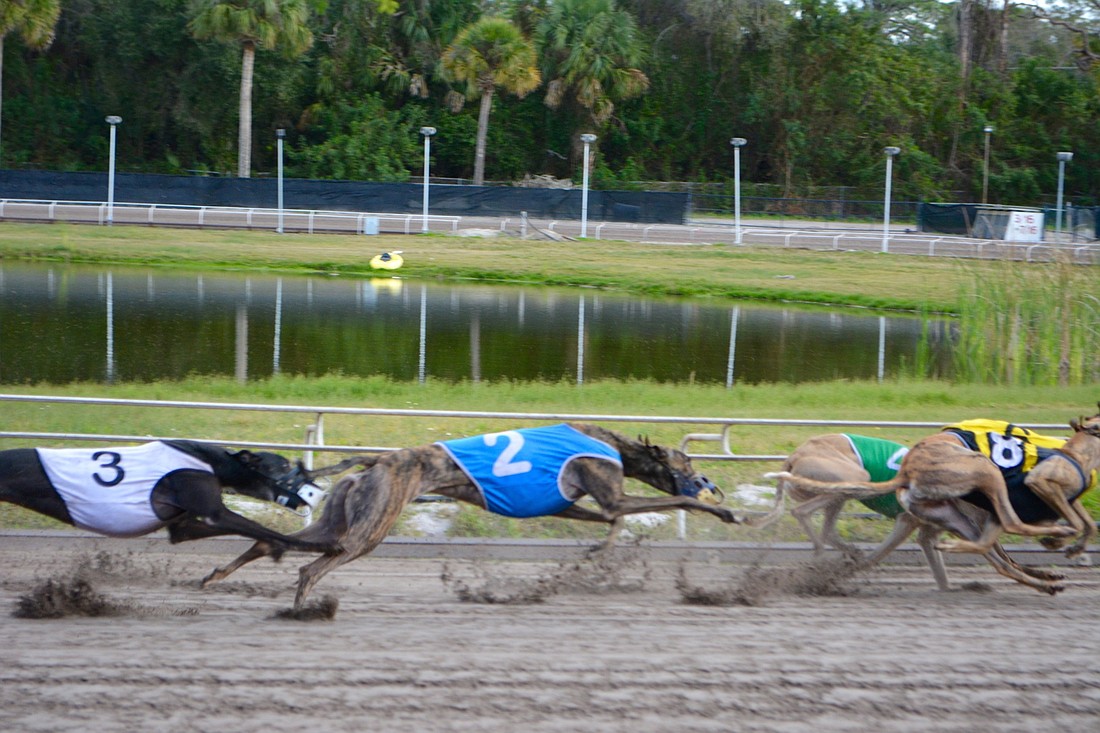- May 10, 2025
-
-
Loading

Loading

Pounding paws and spraying dirt are not a new sight at Sarasota Kennel Club.
In fact, commercial dog races are held during the season every day but Sunday, and scores of locals have poured into the club since 1929 to place bets, watch the greyhounds fly past and hope their money won’t fly away with them.
All of that is about to change.
Approximately 69% of Florida voters effectively put a timer on Sarasota’s own local dog track when they voted Nov. 6 to approve Amendment 13, which “phases out commercial dog racing by 2020.” As a result, the Sarasota Kennel Club, at 5400 Bradenton Road, recently announced that this season, which began Dec. 14, would be the club’s 74th and final.
And fans are spending whatever time they can at the track. Beers, pretzels and programs in hand, many fans have been coming regularly for several years. The dog races, they say, are something they’re sad to see end.
“I only come a couple of times a year, but it’s been probably 10 to 20 years that I’ve come in the wintertime,” said Marcia Brazier. “I love the excitement. The thrill of winning, if you can. I feel bad. I think it’s good entertainment for the people.”
Suzanne Todt, a resident of Venice, expressed similar sentiments, noting time during which the races remained a part of the community.
“It’s just an afternoon out, especially when you have it with family,” she said. “It’s just something that you hate to see go because it’s been here for so long. And you know, people think of Florida and they think about the dog races. And that’s going to be gone.”
So why end a year early?
“There’s a few reasons. It’s pretty complicated,” Sarasota Kennel Club spokesperson Cole Collins said. “Our main reason is because we came to the realization that, if you don’t move with the times, you will be left behind. And there’s no way that we’re going to change this law, so we have to move toward the future.”
Florida is one of six states in the U.S. to still hold operational dog racing tracks for gambling purposes, alongside Texas, Iowa, Alabama, Arkansas and West Virginia.
Amendment 13 was the conclusion of a longtime campaign to end dog racing. Opponents of the sport say the dogs are treated inhumanely.
“This is the most historic event for greyhound advocacy and adoption in the world at any time,” said Christine Dorchak, president of advocacy group GREY2K USA Worldwide, after the amendment passed. “I can’t overstate that. This organization has been working for nearly 20 years to reach this moment where Florida voters would vote down the cruelty of dog racing, now it’s sending a signal around the world that it’s time to end dog racing.”
Of course, not everybody agrees. Sarasota resident Mary Kester, for example, feels that the races are a positive physical outlet for the dogs.
“I came here first in 1980 and I’m sad to see the dogs go. I had a greyhound and she loved to run,” she argued. “That’s what they’re trained to do. They love it. And any chance she could get, she would run there. So, I think it’s a shame we’re going to lose all those dogs.”
Others, however, feel they weren’t even equipped with all of the information they needed to make an informed decision on the matter in the voting booth.
“We don’t know where the facts come from,” attendee John Staab said. “They don’t tell us exactly where the facts come from. And that’s what I would like to know. And, if it is really bad for the dogs, then I agree with it. Let’s stop it. But I don’t know if it is or not.”
Having overheard nearby conversations, meanwhile, some folks at the edge of the track were shocked to learn that Amendment 13 had taken place. News of the Kennel Club’s final season, it would seem, had not yet reached everyone.
“No more dog racing? Not anymore? Not anywhere?” racing fan Lisa Bergeron asked. “Well, that’s sad because I don’t think that the dogs are in bad shape. I don’t think they’re treated badly.”
In addressing the issue, Collins says he understands the concern for the dogs.
“The greyhounds are treated totally fine,” Collins said. “They’re fed correctly. They have a home. They love to run.”
But what both sides can agree on, it seems, is that everybody wants to see that the dogs to remain safe and cared for once the ban goes into effect. For instance, racing fan Carmine Menna expressed concern over the large number of greyhounds that would be in need of a good home across the state.
“I think the animals are taken care of. People have jobs. It’s good all around,” he argued. “But there’s what, like 5,000 dogs throughout Florida? Maybe more? They’re already having a hard time and then you flood them with 5,000 more? That’s going to be even harder.”
The Sarasota Kennel Club does not own the dogs that run there. Rather, it is simply a host for kennels that travel seasonally around the state of Florida. And, while they’re in town, they do what they can to support the adoption process.
“We are hoping that every dog will get adopted, but it’s two years down the line,” Collins said. “I can’t positively tell you how all these dogs are going to get adopted. It’s an issue.”
The last day of the season is May 4. After that, the Kennel Club will transition to a poker-only facility that continues to simulcast dog races that take place in other locations. The owners, Collins said, also might choose to develop the land for other commercial uses, though nothing is concrete at this time.
Jobs could also disappear. Though the club plans to try retaining as many staff as possible, Collins said some positions are directly linked with live dog racing.